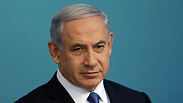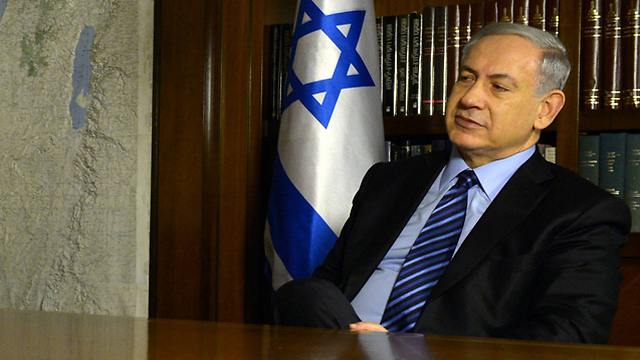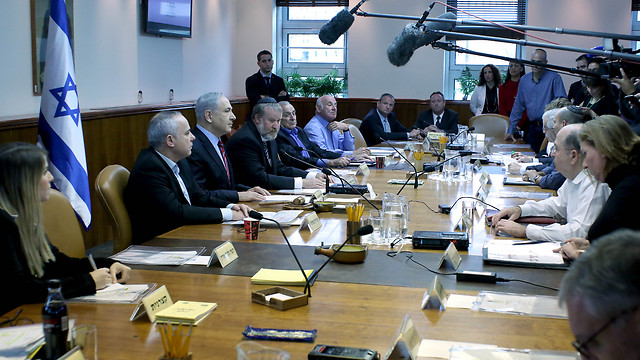
Netanyahu's election spin cycle
Analysis: Is the prime minister so obsessed with passing the widely unpopular nationality bill in an effort to sabotage his own coalition and position himself as a devout Zionist? If not, why is he wooing the haredi parties on a daily basis?
1. What a wonderful country
For a long time there hasn't been such an outrageous session of the Knesset plenum as the one on Wednesday, for the cost of living debate, even if the only thing not debated was the cost of living itself.
If anyone still had doubts whether the prime minister does or does not want elections, one thing was clear: Netanyahu acts as if they are just around the corner. His speech to the Knesset was an election speech in every sense of the word. His campaign people can take now complete sentences and use transform them into messages, catchphrases and anything else that might serve in the next election season.
Like a truism that is oft repeated for its veracity, the prime minister repeatedly scolded the members of the opposition with the phrase: "You didn't evacuate, you didn’t do it."
The leader of the opposition, who should pay attention to the changes he undergoes and the adjustments as he prepares to run for prime minister, tried to nip that slogan in the bud. Taking the podium, Herzog detailed the evacuations that Netanyahu actually has achieved: "You cleared out Hebron and voted in favor of disengagement. You cleared out people from their public housing. You cleared out the refrigerators of Israeli citizens. You cleared out their pockets and their wallets. You cleared them out of a future for their children. You cleared out and did nothing."
One has to admit that as campaign speeches go, Netanyahu's was masterful. It had rhythm, passion, repeated mantras – played exactly by the book. True, it was not the topic of discussion for which he was invited to the plenum, but since when do politicians respond to what they are asked and not what they choose. And the prime minister talked about everything – from the nationality bill to the wonderful achievements of his governments over the years, including his failed government of his first term, which was ousted in disgrace.
According to Netanyahu's speech, this country would not have existed for years, if it were not for him guiding it in every aspect - economy, security, infrastructure, education, multiple reforms. But one question should have been put to him before he left the podium: If everything is so great, why is it so bad? And how is it that all of these achievements have left us at an unprecedented low in any area that you care to name?
Who is he trying to fool when he praises himself for the sanctions on Iran, when it is clear to all that Iran has never been closer to the bomb than it is today? And when he talks about economic reforms, which have transformed Israel from a country with low GDP to a country with high GDP, why he does not mention the poverty index, which has soared to unprecedented heights on his watch? And when he talks about the deadly blow we delivered to Hamas, why does no one say, a blow – maybe, but deadly?

Come on. Not only did we not pulverize them in Gaza, we now have it in Jerusalem as well.
But if one is still seeking proof that Netanyahu is keeping the door open to elections, one should take note of a compromise reached this week by his lawyer, David Shimron. At the last Likud convention, far-rightist Moshe Feiglin, who is running against Netanyahu and Danny Danon for the Likud leadership, demanded that party primaries set for January 6 could not be the last if the elections were not held within six months of that date. In other words: If Netanyahu is elected in January and there is no general election within six months, there will be more primaries for the party leadership.
A vote was held by the Likud Central Committee, and the result was so tight that Danon decided on another, secret ballot. Netanyahu argued that this was a change in the party's constitution and appealed to the Likud judicial body, trying to reach a compromise. The prime minister demanded that there be a year before the next primaries, apparently so he could oversee the next state budget. The compromise was nine months. This means that if Netanyahu does not want a new primary for prime minister, elections will have to take place no later than October 2015.
2. Looking for a fight
Election or no elections - that is the question. Has the prime minister decided that he is going to elections, as appeared to be the case on Sunday, when the government voted on Ze'ev Elkin's nationality bill and Netanyahu was determined to bring it to a full Knesset vote the following Wednesday, or does he want to avoid them, as it seemed when he delayed the vote for another week, and in his Knesset speech hinted that the vote will be on his version of the bill, milder than that of Elkin.
Or perhaps this is all a maneuver by Netanyahu and Elkin, who always intended to pass the bill drafted by the prime minister. The plot would have gone as follows: First present the radical bill by Elkin and insist on its passage, thereby causing Livni and Lapid to react wildly - which is always a bonus - and declare that they will not allow the bill to pass even at the price of the government collapsing. Then introduce Netanyahu's version, a far more moderate draft than Elkin's, and Lapid and Livni would not be able to oppose it.
What is clear is that Netanyahu has also undergone some kind of experience since the government was introduced to Elkin's bill: He discovered that the bill is unpopular even among Likud members, and perhaps it was a mistake to fight for such extreme legislation. If he thought that by passing it he would appear as a Zionist and a patriot, then it has backfired.

The list of the bill's opponents is long and distinguished. From Minister Limor Livnat, who atypically for Likud members has found some courage; through Moshe Arens, the former defense minister who Netanyahu holds in high esteem, and who claims that the legislation is unnecessary and damaging; to Attorney General Yehuda Weinstein, who says such a bill should not be enacted; and even President Reuevn Rivlin, who every day proves himself a perfect fit for his post, who argues that not only does the bill not strengthen the Jewish character of the state – its advancement will even weaken it.
Netanyahu can pretend that these things do not affect him, but we do not have to believe that. In such cases there are two Netanyahus: The extreme, impulsive one, giving weight to those who whisper in his ear – currently Ze'ev Elkin and Yisrael Katz, and Netanyahu the outsider, who never found his place among the esteemed old guard of the Likud, who in his heart he values and respects, and would love to be a part of.
And now he has found himself on the side of the Likud's extreme-right camp, those who are pushing the party and the state via racist and anti-democratic laws in a direction in which it is doubtful that Netanyahu himself wants.
In the coming days we will know how far Netanyahu intends to go with this. Whether the bill put together by Elkin will be put to a vote on Wednesday and the coalition falls apart, or whether he will shelve it and only bring his own formula to a vote, thus saving his government.
But a bill such as the one Netanyahu will present may take months of work. It will have to go through legal advisers, relevant ministries, even academics. It will be hard to do all of that by Wednesday. The question is, as always, how much do they want it.
This week I asked around as to why Netanyahu insisted on bringing Elkin's draft to a vote, if in any case he intends to pass his own bill.
If I understand correctly, it is indeed a question of tactics. If they are going to enact the law, my source says, there will be many stages of negotiation and dialogue between the parties. Each side will pull in its own direction. If only Netanyahu's version is on the table, it will be up to him to compromise, so therefore it is vital to have other, more extreme versions. Yes, this is a tactic of legislation, admits the source. The question is, where do you start?
You start with negotiations. Therefore rightists MKs want Netanyahu's text to be the center point, and not the text that will be changed. So while the country is roiling with searing hatred, and the world is having difficulty understanding the meaning of this racist legislation, the Prime Minister's Bureau is engaging in tactics and refusing to see the damage that it is doing in - every respect in general and with its timing in particular.
And if at the end of last week it seemed that the dispute on the nationality bill was almost over, then came the massive brawl at Sunday's Cabinet meeting, which was testament to the fact that all members of this coalition are just looking for a fight.
The one-week extension on the vote is unused, and in fact since Monday, there has been nothing resembling dialogue between the sides. Going on the various speeches in the plenum, this extension is being used less to find a solution, and more for campaigning.
So at the moment everything is stuck. If that's how it goes next week as well, we can start counting down the remaining days of this government. If there is no chance for compromise, it will all implode, and the annals of the State of Israel will record that at this time, when the Middle East was burning, and when the state's security, economic and international situations had hit rock bottom in way that had not been seen here for many years - the Israeli government chose to embark on election campaigns and drag the country into an unnecessary and harmful issue that should never have seen the light of day in the first place.
The price of hesitation
But the prime minister is busy not only with the nationality bill. Every single day, Netanyahu's people are holding intensive contacts with religious parties. The reason: Netanyahu is promising the heads of the religious factions that if they commit themselves to recommending to the president that he be prime minister after the next elections, he will bring down the current government and call early elections.
It's no secret that the haredi public cannot stand another day in opposition and that they are in agreement that they should do everything in their power to bring about an election. The only differences are over whether they should promise Netanyahu their support after the elections. Source in the ultra-Orthodox parties confirm that there has been a proposal by the prime minister's camp that he will declare elections, and they, the ultra-Orthodox, will support him to the president.
On the other hand, sources close to Netanyahu say that the prime minister has only sought ultra-Orthodox guarantees that if the government falls, they will not support an alternative government.
Deri has already been clear about this more than once - be no alternative government. Moreover, it turns out that Deri promised Netanyahu that if next week there is a vote of no confidence and Lapid, Livni and Lieberman back it and make up the necessary 61 MKs - Shas will not support the motion.

Deri's position is therefore clear: No alternative government, neither on the right nor the left, without elections. The Haredim see that Lieberman, Lapid and Livni do not want elections and instead of dissolving the Knesset and setting a date for elections, they will try to convince Netanyahu to continue for another year, to compromise, to forcibly keep the wheels on the coalition bus.
It is no coincidence that after opposition leader Herzog's vehement speech in the plenum, Silvan Shalom, one of the more precocious Likud MKs, goaded him with a called question, "So why not present a proposal to dissolve the Knesset?"
The indecision of the leaders the parties in the coalition and their fear of elections may push the haredim to commit to Netanyahu, inasmuch as if there is an agreed date for elections, they will be able to decide afterwards whom to support.
If this happens, Lieberman, Livni and Lapid, who are radiating unwillingness to go to the polls, are themselves tying the ultra-Orthodox to Netanyahu and Bennett, thereby not only losing any chance of establishing the next government but also losing the opportunity of joining a broad coalition.
After all, with Bennett and the ultra-Orthodox in his pocket, Netanyahu will not even consider them.











